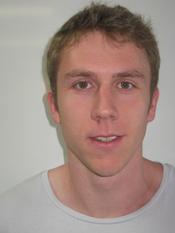Adam Christopher Walker
PhD Student
Research Interests
Adam is interested in using formal techniques to synthesize device drivers from existing device specifications. This approach will dramatically reduce the number of operating system faults caused by drivers as well as driver development time.
Contact Details
More contact information is available at the
Contact page.
Publication List
Projects
Termite seL4::Wombat
Qualifications
BE specialising in Computer Systems Engineering, University of Auckland, New Zealand. First Class Honours.
Publications
Best Papers


|
 |
Leonid Ryzhyk, Adam Christopher Walker, John Keys, Alexander Legg, Arun Raghunath, Michael Stumm and Mona Vij
User-guided device driver synthesis
USENIX Symposium on Operating Systems Design and Implementation, pp. 661–676, Broomfield, CO, USA, October, 2014 |
Trustworthy Systems Group Papers
2014


|
 |
Leonid Ryzhyk, Adam Christopher Walker, John Keys, Alexander Legg, Arun Raghunath, Michael Stumm and Mona Vij
User-guided device driver synthesis
USENIX Symposium on Operating Systems Design and Implementation, pp. 661–676, Broomfield, CO, USA, October, 2014 |

|
 |
Adam Christopher Walker and Leonid Ryzhyk
Predicate abstraction for reactive synthesis
Conference on Formal Methods in Computer-Aided Design, Lausanne, Switzerland, October, 2014 |

|
 |
Adam Christopher Walker and Leonid Ryzhyk
Predicate abstraction for reactive synthesis
Technical Report NRL-8281, NICTA, August, 2014 |

|
 |
Nina Narodytska, Alexander Legg, Fahiem Bacchus, Leonid Ryzhyk and Adam Christopher Walker
Solving games without controllable predecessor
International Conference on Computer Aided Verification, Vienna, Austria, July, 2014 |
2013

|
 |
Mona Vij, John Keys, Arun Raghunath, Scott Hahn, Vincent Zimmer, Leonid Ryzhyk, Adam Christopher Walker and Alexander Legg
Device driver synthesis
Intel Technology Journal, Volume 17, Number 2, pp. 136–157, December, 2013 |
2010

|
 |
Ihor Kuz, Gerwin Klein, Corey Lewis and Adam Christopher Walker
capDL: A language for describing capability-based systems
Asia-Pacific Workshop on Systems (APSys), pp. 31–35, New Delhi, India, August, 2010 |




